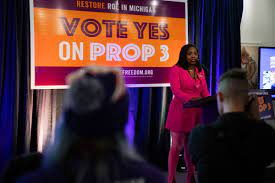Unofficial election night results show that Michigan voters adopted an amendment to include abortion rights in the state constitution after the U.S. Supreme Court overturned Roe v. Wade.
The right to get an abortion is one of the “basic rights to reproductive freedom” that are established under Proposal 3. Additionally, it safeguards rights to care for infertility and contraception, for example.
According to unofficial data collated by the Associated Press as of 5:30 a.m. on Wednesday, with an estimated 84% of the votes counted, 56% of Michigan voters approved of Proposal 3, while 45% voted against it. All three constitutional amendments that would change legislature term limits, increase financial disclosures for some elected officials, and add early voting to the state constitution were adopted by voters on Tuesday.
According to Darci McConnell, director of communications for Reproductive Freedom for All, the organisation sponsoring Proposal 3, “Today, the people of Michigan decided to restore the reproductive rights they’ve enjoyed for 50 years.” “The approval of Proposal 3 is a historic win for access to abortion in our state and in our nation; Michigan has set the path for upcoming attempts to fully reinstate the rights and protections of Roe v. Wade on a national level.”
One of the numerous canvassers who collected signatures to submit abortion rights to a statewide vote in Michigan was Alyssa Tigue, a 34-year-old voter from Ferndale. She remarked Tuesday in front of her voting location at Ferndale High School, “It’s incredibly essential for individuals to have control over their own body, and it’s between a woman, their family, and their doctor, not the government.”
The amendment, according to its proponents, was required to stop the implementation of a 1931 state legislation that made most abortions illegal, including those performed in rape and incest situations. In response to a lawsuit filed by Democratic Governor Gretchen Whitmer asserting that the abortion restriction violates the Michigan Constitution, a court temporarily halted the execution of that statute. Reproductive Freedom for All claimed in a statement that Proposal 3’s win made Michigan the first state in the nation to overturn a statewide prohibition on abortion.
After Michigan voters defeated two abortion-related ballot proposals in earlier decades, support for Proposal 3 has grown.
Michigan voters rejected a measure to permit doctors to perform abortions up to 20 weeks gestation in 1972, the year before the U.S. Supreme Court handed down its historic Roe v. Wade decision ensuring a nationwide right to abortion. A ballot initiative that would have prohibited public funding for abortions performed by those on public assistance unless they were required to save the mother’s life was likewise defeated by Michigan voters in 1988.
Legal authorities have claimed that Proposal 3 affords Michigan residents substantial protections for their right to get abortions. Unless they are justified by “the restricted goal of safeguarding the health of an individual seeking care, compatible with clinical standards of practise and evidence-based medicine,” restrictions are prohibited under the amendment.
As long as politicians do not outlaw abortions required “to safeguard the life or physical or mental health of the pregnant individual,” it opens the door to regulating abortions later in pregnancy when a medical practitioner deems a foetus viable.
The idea has been slammed as excessive by opponents who claim it will eliminate parental notification laws for children seeking abortions as well as health and safety standards for abortion clinics. Legal authorities have refuted those assertions. Of course, certain legal arguments over how the amendment is put into practise will likely be decided by the next Michigan Supreme Court.
Reproductive Freedom for All submitted a record amount of signatures to meet the requirements for a statewide referendum, but their journey to the ballot was dramatic.
Initially, the state’s elections tribunal was unable to validate the proposal due to political disagreements over claims made by the amendment’s opponents that the text disseminated to gather signatures lacked enough word spacing. However, the panel was required by the Michigan Supreme Court to consent to the proposal before a vote.
By November 22, county canvassing boards must have reviewed and approved the election results. The outcome of the Proposal 3 vote will be certified at a meeting of the Board of State Canvassers on November 28.
